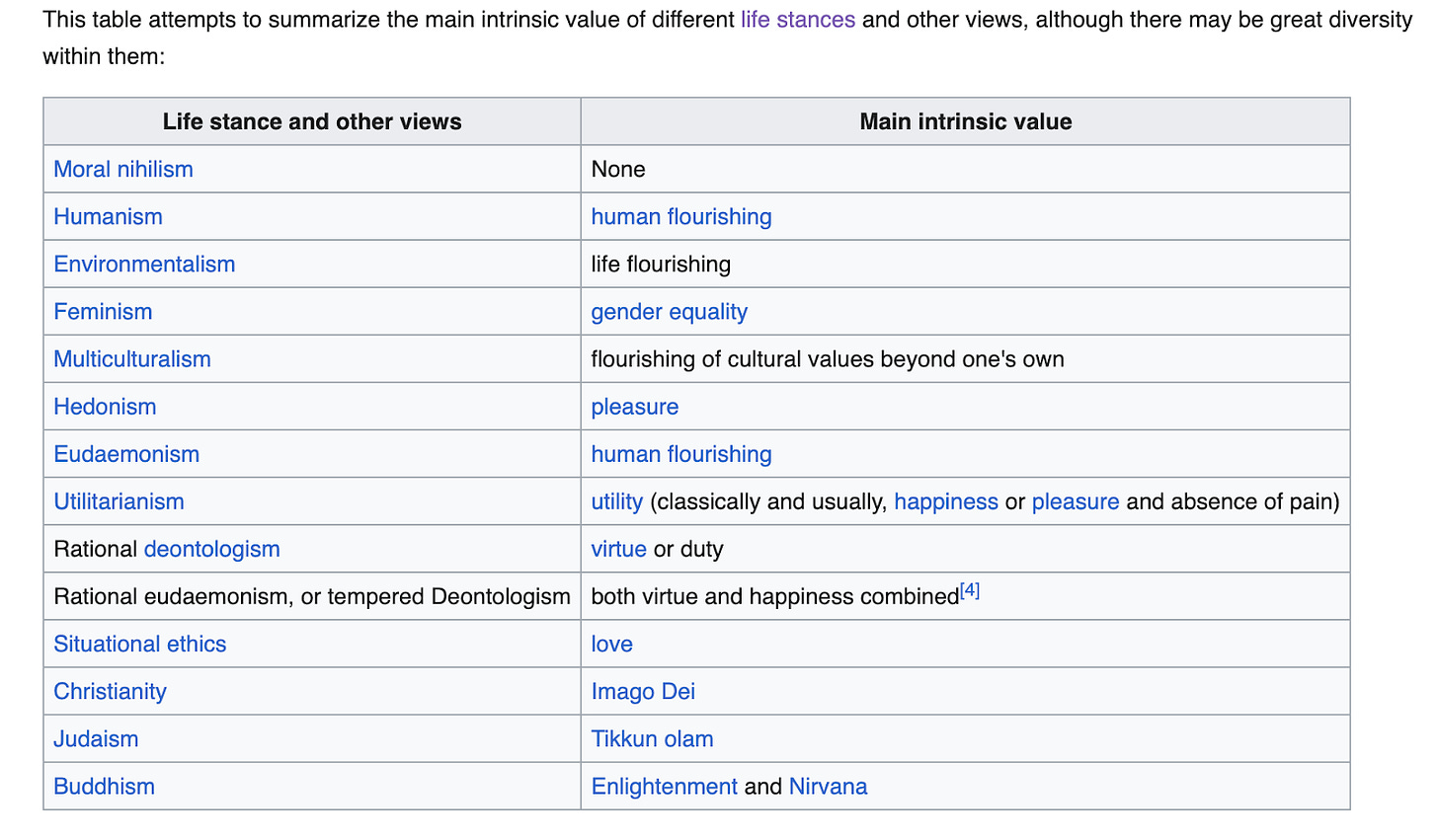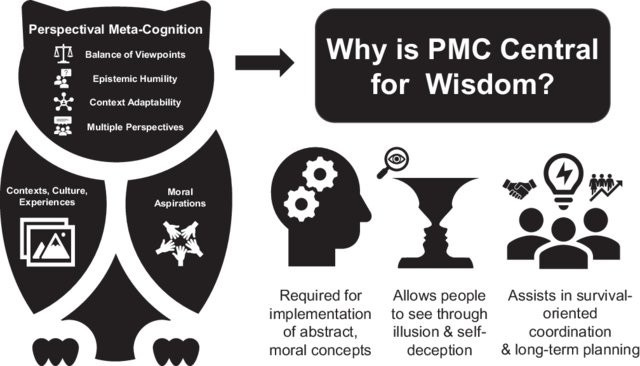I distinguish between "doing philosophy" and "having a philosophy." The former is an inquiry into the unknown, aiming for greater clarity and being surprise-ready by whatever values unfold. The latter provides someone with their "is and ought" coordinates—how to understand reality and how they ought to live in it.
Here are terms sometimes used interchangeably with having a philosophy: worldviews, reality tunnels, maps of reality, umwelts, memeplexes, and life stances; religion or ideology are the terms when spiritual or political matters are the focus. All the living philosophies in the wild of the "noosphere" (our collective consciousness) fascinate me. I am equally fascinated by how most people's living philosophies are borrowed, born into, and arrived at through "mimetic desire," adopting someone's philosophy you admire. Most people do not arrive at the philosophy they have through doing philosophy.
Each philosophy has "values" that guide a person. Axiologist
defines values as "attentional protocols." Values put people's attention on aspects of reality in a way that demands particular behavior. "Intrinsic values" or "sacred values" are uncompromisingly held for their own sake, and if kept in earnest, someone is willing to die or kill for them, or impotently culture war for them.
Having a philosophy and all the propositional architecture that goes along with it puts existential horse blinders on a person, placing their attention on a specific aspect of reality. Having a philosophy is unavoidable. Doing philosophy is very avoidable. One challenge of not doing philosophy is getting stuck in a coherent philosophy that is no longer wise to have or was never wise to have in the first place.
Yet, most people rarely adopt a coherent philosophy; they have an incoherent one, stumbling into what meta-rational blogger David Chapman calls a “thought soup,” different living philosophies mushed together.
Since the mainstream culture broke down, it is no longer considered important where ideas came from. Everyone says, and thinks, things like:
“You have to honor your feelings”
“All religions point to the same truth”
“You have to make your own, authentic choices, and fight off the mindless messages you get from society”
“Everyone has their own truth, because everyone has their own perspective”
“Be in the now”
Almost no one in the West had ideas like these a hundred years ago. Almost no one now realizes that they come from (respectively) psychotherapeutic theory, Hinduism, Existentialism, post-modernism, and Buddhism. Almost no one recognizes that if you take such ideas seriously, they are seriously incompatible.
Thought soup philosophies, while value promiscuous, do not provide one with the necessary existential horse blinders needed for behaviors to conform to a value. Instead, thought soupers are left adrift in the noosphere, splashing between values with no central value to guide them.
Having a thought soup leaves one vulnerable to whatever "The Current Thing" is or what contradicts it. The Current Thing is whatever values go viral. You must support these values and the propositions that go with them without question or be deemed evil, stupid, or brainwashed.
The art of living is to have a philosophy whose central practice is doing philosophy. Doing philosophy protects one from adopting a hardened coherent philosophy, ignorant and aggressive to other values, or stumbling into a mushy incoherent philosophy that ungracefully drifts between values, allowing capture by the viral values of The Current Thing. Having a philosophy that does philosophy has a principal value: wisdom.
Philosophy is popularly known as the love of wisdom. If one genuinely does philosophy, one will fall in love with wisdom. According to psychologist Igor Grossman, wisdom is defined as the "meta-value that adjudicates between all other values." Combining Grossman's definition with Edelman's definition of value, wisdom is the attentional protocol that affords all other values. To do philosophy, one must have their attention open to the whole so that all values can be valued.
‘Those who love wisdom must investigate many things.’
Heraclitus
Grossman was a part of the “Toronto Wisdom Task Force,” a group of psychologists studying wisdom. The task force cohered on "perspectival meta-cognition” (PMC) as an integral aspect of wisdom. According to the task force, to be wise, one must be able to take multiple perspectives while having humility about their current one.
Social philosopher Daniel Schmachtenberger refers to PMC as taking a “transperspectival” approach.
Each perspective looks at reality through a particular value, and a value puts reality through a specific lens. Seeing reality through more values, especially neglected ones, engenders a greater capacity to navigate reality well. Therefore, doing philosophy requires being in a transperspectival state, not collapsing into one value and knee-jerkily rejecting the rest.
I do not see a “wisdom commons” - a place that makes wisdom more common - emerging without a transperspectival project occurring first.
A Transperspectival Project
For the last 3.5 years, The Stoa has been a transperspectival project. We have had over a thousand events, interviewing people from various living philosophies, daring to venture across the political spectrum. To display the perspectival diversity, here is a non-exhaustive list of living philosophies hosted:
Extinction Rebellion, effective altruism, applied complexity, applied rationality, postrationality, Street Epistemology, secular guru criticism, the New Right, the Acid Left, manosphere, democratic socialism, metamodernism, anarcho-primitivism, anti-fascist anarchism, Russian ultranationalism, black feminism, decolonial futures, neo-Jungianism, Secular Buddhism, and just a little Stoicism.
Given its transperspectival approach, The Stoa could not be pattern matched or pigeonholed into any living philosophy. Even Transparency.tube - a website that applies a machine learning approach to categorize YouTube channels into political tribes - classified The Stoa with the rare placing of "center."
The Stoa is the most philosophically diverse place on the internet, embodying the transperspectival approach. However, surfing the noosphere via intimacy with the various perspectives can become masturbatory. One cannot cohere a movement or even motivate oneself to move through reality, engaging in a never-ending transperspectival state.
One risks becoming a radical agnostic, equally open to all values, unable to cohere around one. More seriously, if one takes on too many perspectives too fast, they risk going crazy or experiencing what Integral philosopher Ken Wilber calls “aperspectival madness.” This kind of madness occurred multiple times to me, enough times that I have become bored of it.
I am ready to move on.
***
It's official—The Stoa's transperspectival project is over. The last public session at The Stoa was the project’s official close. I do not think one should stay in the transperspectival state forever. It is masturbatory to do so. While eventually becoming masturbatory, the transperspectival project did help me tremendously.
I became intimate with many living philosophies in the noosphere. I had conversations with individuals enamored by them, allowing my body to become attuned to their value. This gave me greater compassion, the capacity to dialogue with diverse people with diverse perspectives, and ultimately gave me access to more values.
It is good to have the capacity to be transperspectival. It is not good to stay in a transperspectival state. As the meme that opened this entry gestured at, sitting around to take more perspectives when the world is burning is not the wise move. Sometimes the wise move is to focus on a value, embody it, and get the fuck out of the house. Besides, not all living philosophies are equal…
Not everyone’s living philosophy is equally good.
Not everyone’s living philosophy is equally true.
Not everyone’s living philosophy is equally beautiful.
Now it is time for me to take off the transperspectival gloves, show some philosophical muscle, and create a scene.







